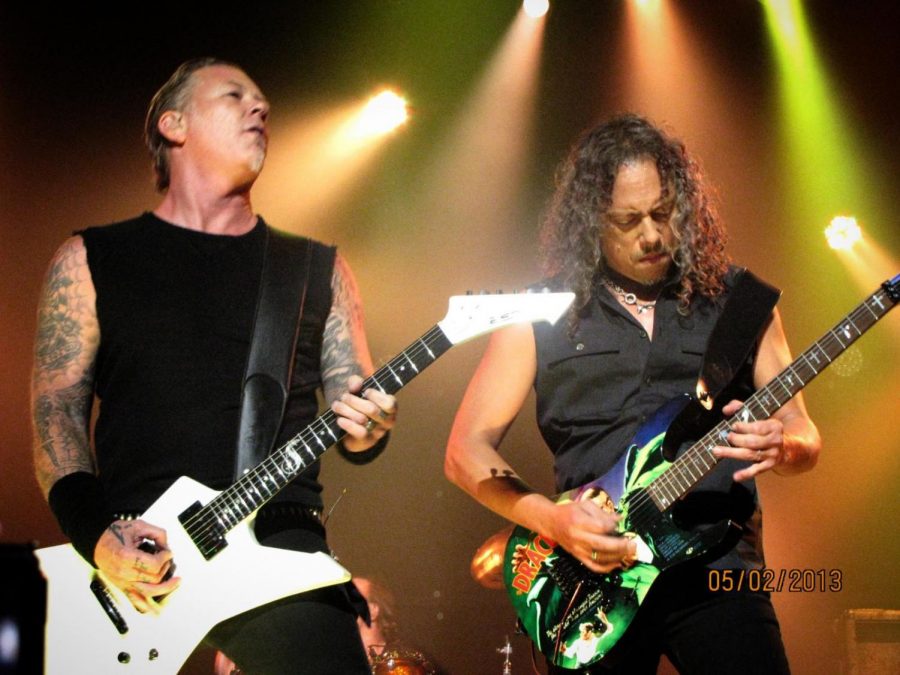“The Metallica Blacklist” celebrates the 30th anniversary of the hard rock classic
Metallica’s “Black Album” turned 30 this year and they are celebrating by letting their musical friends pay tribute.
September 13, 2021
The 2019 movie “Yesterday” had a strange premise: what if only one guy in the world remembered the music of the 1960s British pop-rock band, The Beatles?
The movie suggested that its hero could somehow duplicate The Beatles’ greatest songs and achieve a level of popularity only previously attained by the Fab Four.
The Beatles wrote great songs but were popular for so many other reasons: their music production, their image, their personalities, their story. They also arrived at the perfect intersection of culture and history, as they mirrored the changing 60s counterculture as much as they influenced it.
“Yesterday,” however, assumes The Beatles only mattered because their songs were so awe-inspiring and brilliant that no one can resist their charms, regardless of who performs them.
This is lazy thinking, and after listening to “The Metallica Blacklist,” a four-hour, 53-song playlist released on September 10 in honor of the 30th anniversary of Metallica’s “Black Album,” it becomes clear that just because a song is great doesn’t mean anyone can make it sound good.
“The Black Album” as it is colloquially known, dropped on August 12, 1991 and was an immediate success on the strength of hard rock singles “Enter Sandman,” “The Unforgiven,” “Sad but True,” and “Nothing Else Matters.” It sold over 16 million copies in the U.S., setting sales records at the time.
Part of “The Black Album’s” appeal was how it was a departure for the thrash metal band, much in the way “Sgt. Pepper’s Lonely Hearts Club Band” was a departure for The Beatles from their more straightforward pop-rock stylings. Metallica virtually invented the thrash metal genre in the 1980s, releasing classic albums like “Ride the Lightning” and “Master of Puppets,” but on “The Black Album” they abandoned their 10-minute thrash epics for tighter, radio-friendly rock.
The decision paid off, and 30 years later Metallica’s popularity and appeal are undeniable. With that in mind, the band decided to celebrate the anniversary of their crowning achievement by showing how their music is more than merely metal.
“The Metallica Blacklist” features performances by a wide range of pop, rock, country, and indie artists—both well-known and unknown—paying tribute to their favorite songs on “The Black Album,” with all proceeds from streaming going to Metallica’s charitable foundation All Within My Hands.
Four hours is a lot of time to spend listening to endless versions of the same song. After a while it becomes achingly clear great songs are only part of Metallica’s appeal.
However, even as this playlist pays tribute to the 1990s, it is built for the 2020s. The joy of listening to each cover is making any number of combinations for your own playlist. These four hours can be pared to one hour in a thousand combinations, each with their own vibe. In its way, this is an ambitious project that makes experiencing Metallica’s classic more interactive than sliding a CD into the car stereo.
Still, four hours is a lot of listening, so here are the songs on “The Metallica Blacklist” that need to be heard.
“Enter Sandman” – Rina Sawayama
The crown jewel of Metallica’s career is transformed from a hard rock nightmare into an electropop assault on the senses by the Japanese-British singer-songwriter. Sawayama’s voice cuts through the wall of crackling guitars and thudding beats like a digital knife, almost like a 21st century digital sandman, come to bring a nightmare straight into your streaming device.
“Sad But True” – Jason Isbell and the 400 Unit
Alt-country king Jason Isbell makes this potent rocker a blistering country jam. The slide guitar is an inspired choice for the major riff. And Isbell, whose own story of substance addiction mirrors that of James Hetfield’s, finds a personal connection to the lines “I’m your dream, mind astray/I’m your eyes while you’re away/I’m your pain while you repay/You know it’s sad but true.”
“Holier Than Thou” – Corey Taylor
With all the country, pop, and indie covers of Metallica’s classics, it is refreshing to hear something that sounds like . . . well, Metallica. The frontman of Slipknot covers this down-and-dirty screed against pious hypocrites with the appetite of a starving man at a buffet. He’s no Hetfield, but he definitely understands the assignment.
“The Unforgiven” – Flatbush Zombies
Hip-hop and metal have long had an odd relationship. From Public Enemy and Anthrax, to the nu-metal craziness of DJ’d groups like Limp Bizkit, the fit has always felt more respectful than artistically natural. However, in this cover of “The Unforgiven,” one of “The Black Album’s” more iconic tracks, the Brooklyn-based rap trio sample the original’s chorus and lay it over some personal history about those people in their lives they can’t forgive.
“Wherever I May Roam” – J Balvin
Columbian artist J Balvin turns the slithering riff on “Wherever I May Roam” into a seductive loop that takes on the exotic feel of a belly dance before tearing into the Metallica song like a mechanic stripping a car for its parts. Balvin also shortens the original down to two-and-a-half minutes, making it clear that sometimes longer is not necessarily better.
“Don’t Tread on Me” – Volbeat
This is a straightforward cover of the original by Danish rockers Volbeat. Singer Michael Poulsen sounds like he could have fronted 80s arena rock band, Europe, making Metallica sound more like an 80s hair metal band than they, or anyone, ever imagined. And that is meant as a compliment.
“Through the Never” – The HU
“The Black Album” was popular here in America, but it was also mega-popular across the globe. Mongolian heavy metal band The HU obviously took inspiration, and here get a chance to show off their love for Metallica with their distinctive brand of “hunnu rock,” employing traditional Mongolian instruments like the morin khuur (also known as the horsehead fiddle), the tumur hhuur (the jaw harp), and the tovshuur (three-stringed lute). The solo on “Through the Never” has not sounded this fresh since 1991.
“Nothing Else Matters” – Phoebe Bridgers
There are 12 covers of “Nothing Else Matters” on “The Metallica Blacklist,” by far the most beloved song on “The Black Album.” Phoebe Bridgers, coming off the success of her album “Punisher,” brings that album’s intimate energy to her breathy, lithe take on the song. She’s just a girl at a piano in a room, reflecting on her relationships.
“Of Wolf and Man” – Goodnight, Texas
While “Nothing Else Matters” had 12 covers, “Of Wolf and Man” has the distinction of being the only song to have just one. However, indie folk rockers Goodnight, Texas—named for the town in Texas—turn this song about lycanthropy into a song that could have been recorded by 1970s legends The Band. It’s a stomping bit of roots rock, and since this is one of “The Black Album’s” lesser-known tracks, their version of “Of Wolf and Man” takes on a life of its own.
“The God That Failed” – IDLES
Pitchfork describes IDLES’ version of this track as “a bug-eyed post-punk exorcism.” While this is typical rock critic word soup, it is also an accurate description. This British rock outfit twists the song’s head around and perverts it with screeching guitars, distant growling vocals, and scattershot drumming that might even make Lars Ulrich queasy.
“My Friend of Misery” – Kamasi Washington
It is likely that many will discover Kamasi Washington as a result of listening to his version of “My Friend of Misery,” and that is fitting. The Los Angeles native is one of the true ambassadors of modern American jazz, and his saxophone scorches both the heaven and earth every bit as much as Kirk Hammett’s guitar. He also transforms Metallica’s work into a quick jazz odyssey, which is an inspiration in and of itself.
“The Struggle Within” – Rodrigo y Gabriela
Mexican duo Rodrigo y Gabriela are no strangers to Metallica. They covered “Orion” on their self-titled debut album back in 2006. They return to the comforts of Metallica with this flamenco-tinged acoustic thrash version of “The Black Album” closer. And they recapture the same magic with this instrumental.







